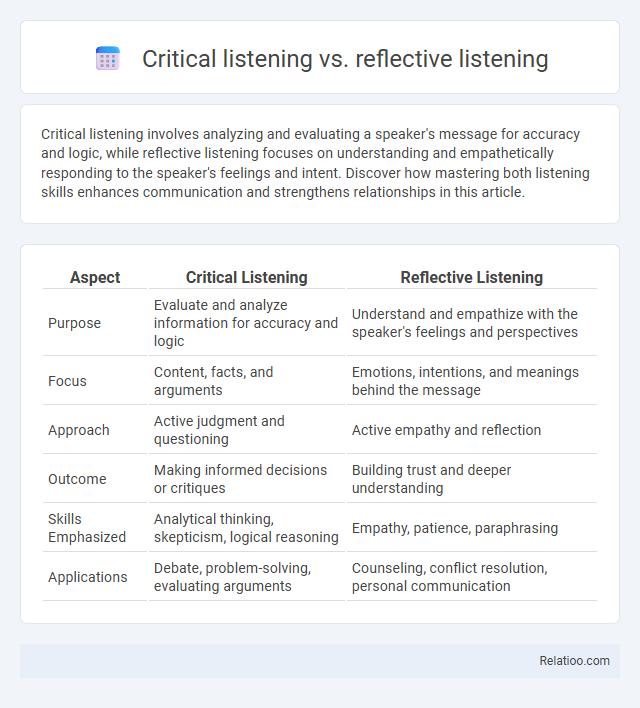Critical listening involves analyzing and evaluating a speaker's message for accuracy and logic, while reflective listening focuses on understanding and empathetically responding to the speaker's feelings and intent. Discover how mastering both listening skills enhances communication and strengthens relationships in this article.
Table of Comparison
| Aspect | Critical Listening | Reflective Listening |
|---|---|---|
| Purpose | Evaluate and analyze information for accuracy and logic | Understand and empathize with the speaker's feelings and perspectives |
| Focus | Content, facts, and arguments | Emotions, intentions, and meanings behind the message |
| Approach | Active judgment and questioning | Active empathy and reflection |
| Outcome | Making informed decisions or critiques | Building trust and deeper understanding |
| Skills Emphasized | Analytical thinking, skepticism, logical reasoning | Empathy, patience, paraphrasing |
| Applications | Debate, problem-solving, evaluating arguments | Counseling, conflict resolution, personal communication |
Introduction to Critical Listening and Reflective Listening
Critical listening involves analyzing and evaluating the information presented to form a reasoned judgment, emphasizing comprehension and logical assessment. Reflective listening requires actively understanding and interpreting the speaker's message by mirroring emotions and content to foster empathy and clarity. Both approaches enhance communication by tailoring responses: critical listening prioritizes objective evaluation, while reflective listening focuses on emotional resonance and validation.
Defining Critical Listening
Critical listening involves actively analyzing and evaluating the content and meaning of a message to form a reasoned judgment. It requires focusing on the speaker's logic, evidence, and intent without immediate bias or emotional reaction. Reflective listening emphasizes understanding and mirroring the speaker's feelings and perspectives, while a judgmental attitude prematurely forms opinions, hindering open communication and effective comprehension.
Understanding Reflective Listening
Reflective listening involves actively focusing on understanding Your conversation partner by echoing their message and emotions, which fosters empathy and clarity. Unlike critical listening, which evaluates and analyzes information for accuracy, or judgmental attitudes that lead to premature conclusions, reflective listening prioritizes validation over critique. This approach enhances communication by ensuring that both parties feel heard and understood, reducing misunderstandings and conflict.
Key Differences Between Critical and Reflective Listening
Critical listening involves evaluating and analyzing information to form judgments, focusing on accuracy, logic, and evidence. Reflective listening prioritizes understanding and empathizing with the speaker's emotions and intentions, aiming to provide feedback that clarifies meaning and feelings. Unlike judgmental attitudes that impose biases or negative evaluations, critical listening critically assesses content without personal bias, while reflective listening emphasizes active engagement and emotional connection.
Benefits of Critical Listening
Critical listening enhances your ability to analyze information objectively, allowing you to identify key points and underlying assumptions accurately. This skill fosters better decision-making and problem-solving by encouraging a deeper understanding of complex ideas without bias or premature judgment. Unlike reflective listening, which emphasizes empathy, or judgmental attitudes that hinder open-mindedness, critical listening promotes intellectual clarity and effective communication.
Advantages of Reflective Listening
Reflective listening enhances communication by allowing you to fully understand and validate the speaker's message, fostering trust and empathy in your interactions. This approach reduces misunderstandings and encourages open dialogue, making it easier to resolve conflicts effectively. Unlike judgmental attitudes, reflective listening promotes a non-biased environment where both parties feel heard and respected.
When to Use Critical Listening
Critical listening is essential when evaluating complex information, distinguishing facts from opinions, or making informed decisions based on data analysis. Use critical listening in academic discussions, business negotiations, and problem-solving scenarios where accuracy and logical assessment are crucial. Reflective listening serves better in emotional support contexts, while judgmental attitudes often hinder objective understanding and communication.
Situations Best Suited for Reflective Listening
Reflective listening is best suited for situations requiring empathy and understanding, such as counseling, conflict resolution, and personal conversations where emotional support is essential. Your ability to mirror the speaker's feelings encourages openness and trust, making it valuable when navigating sensitive topics or emotional distress. In contrast, critical listening suits analytical tasks, while judgmental attitudes often hinder effective communication and relationship building.
Challenges and Pitfalls in Each Listening Style
Critical listening demands analyzing information for accuracy and logic, but can lead to over-skepticism that hinders open-mindedness. Reflective listening requires empathy and mirroring emotions, yet may cause confusion or misinterpretation if you mirror inaccurately or overly personalize the speaker's message. Judgmental attitudes create barriers to effective communication by fostering bias and defensiveness, which limit your ability to understand diverse perspectives and engage constructively.
Developing Effective Listening Skills
Critical listening involves analyzing and evaluating the content for accuracy and relevance, essential for making informed decisions. Reflective listening emphasizes understanding and empathizing with the speaker's emotions and intentions, fostering trust and clearer communication. Avoiding a judgmental attitude enhances effective listening skills by encouraging open-mindedness and reducing biases, leading to more meaningful interactions.

Infographic: Critical listening vs Reflective listening
 relatioo.com
relatioo.com